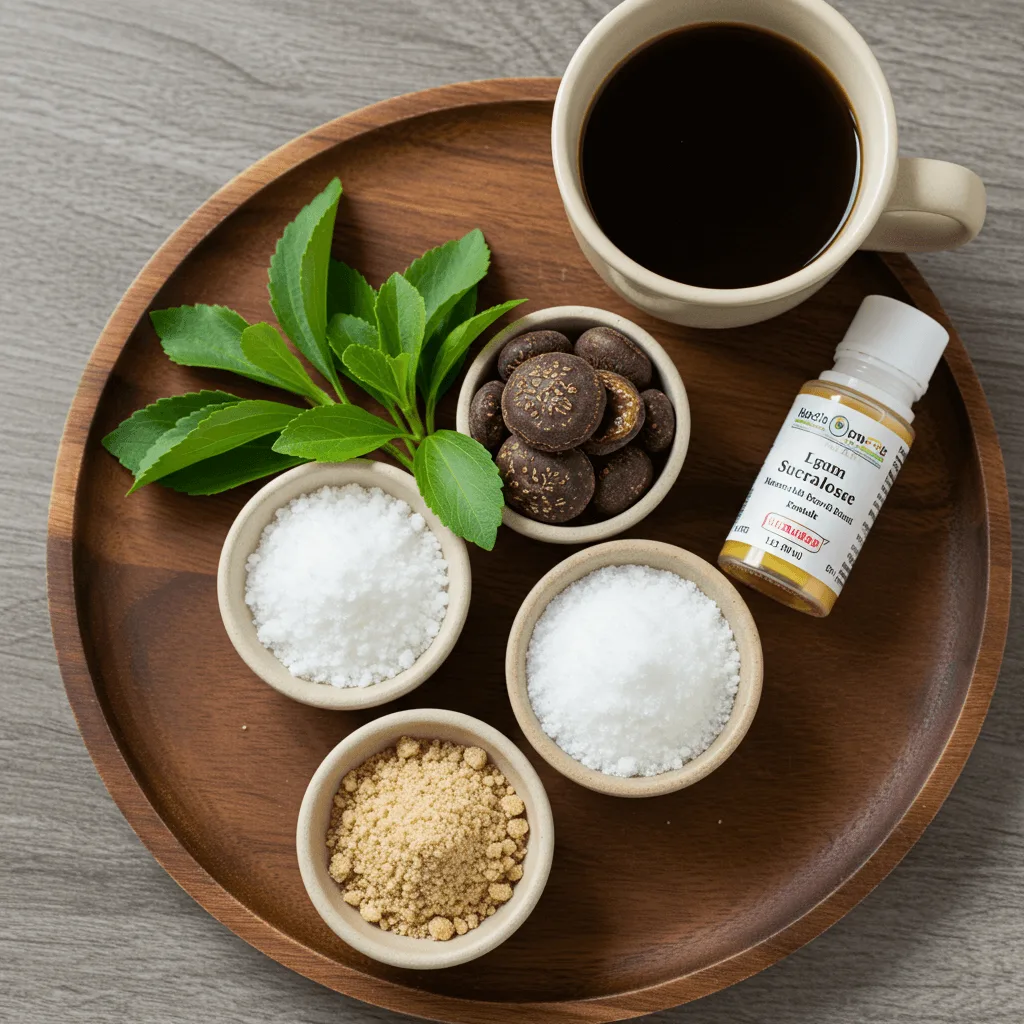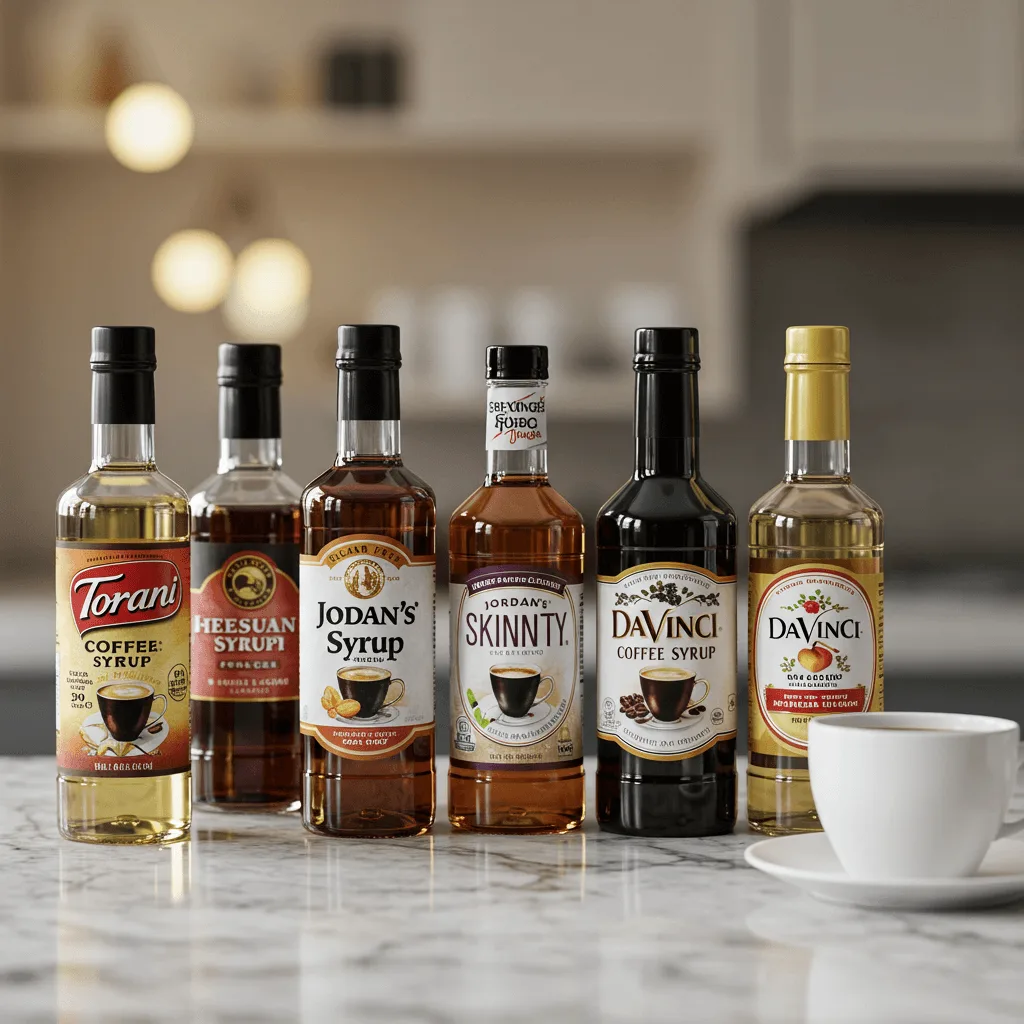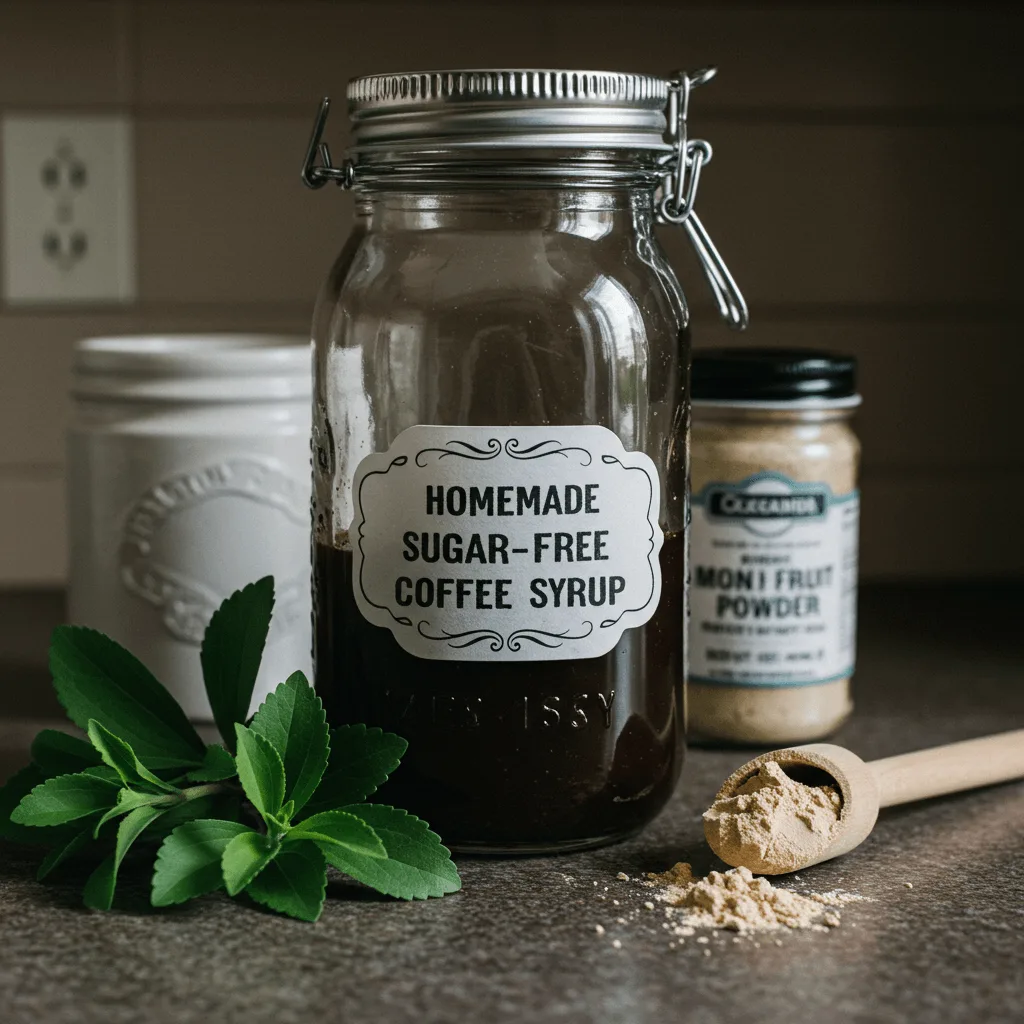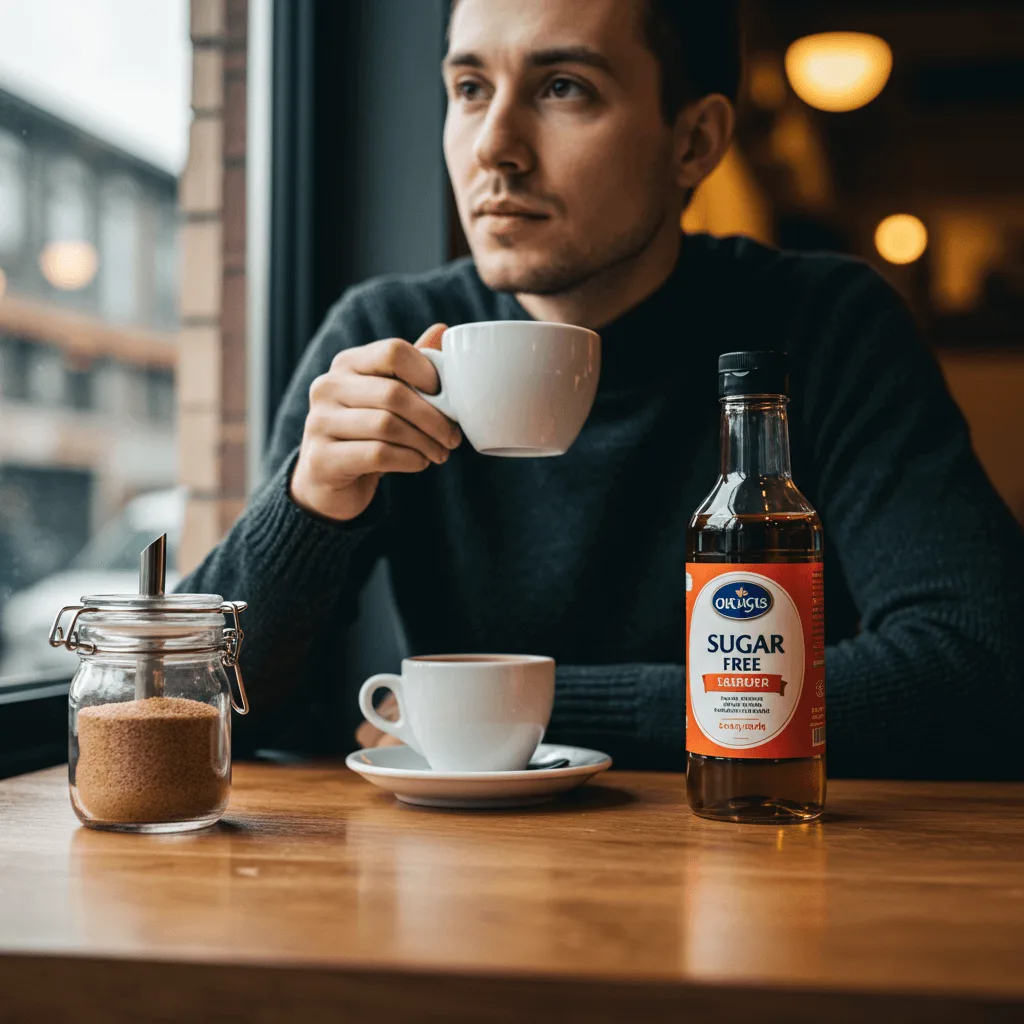Sugar free coffee syrups have become increasingly popular among coffee lovers looking for a healthier alternative to traditional syrups. Whether you’re following a low-carb, keto, or diabetic-friendly diet, these syrups promise the same great flavor without the sugar. But are sugar-free coffee syrups healthy? Do they contain artificial sweeteners, and how do they impact your body?
In this post, we’ll break down what sugar free coffee syrups are made of, their potential health benefits and risks, the best brands to try, and even how to make your own homemade sugar free coffee syrup. Let’s dive in!
What Are Sugar Free Coffee Syrups Made Of?
Sugar free coffee syrups are designed to add sweetness and flavor to your coffee without the extra sugar and calories. But what exactly goes into these syrups? Let’s break down their key ingredients, explore popular brands, and compare them to traditional syrups.
Common Ingredients in Sugar-Free Coffee Syrups
Sugar free coffee syrups typically contain one or more sugar substitutes, along with flavoring agents and preservatives. These ingredients fall into two main categories:
1. Artificial Sweeteners
Many store-bought sugar-free syrups use artificial sweeteners to mimic the sweetness of sugar without the calories. Some of the most common ones include:
- Sucralose (Splenda) – A widely used artificial sweetener that is hundreds of times sweeter than sugar.
- Acesulfame Potassium (Ace-K) – Often combined with other sweeteners to enhance sweetness.
- Aspartame – Found in some brands, though it’s controversial due to potential health concerns.
2. Natural Sweeteners
For those looking for a more natural alternative, some sugar free syrups use plant-based sweeteners, such as:
- Stevia – A zero-calorie sweetener derived from the stevia plant, known for its slightly herbal aftertaste.
- Monk Fruit Extract – A natural sweetener that provides a clean, sugar-like taste without affecting blood sugar levels.
- Erythritol – A sugar alcohol often blended with monk fruit or stevia for a more balanced sweetness.
3. Other Ingredients
- Flavoring Agents – Natural or artificial flavors that create different syrup varieties (e.g., vanilla, caramel, hazelnut).
- Preservatives & Stabilizers – Ingredients like citric acid or xanthan gum help maintain consistency and shelf life.
Popular Sugar-Free Coffee Syrup Brands and Their Ingredients
Several brands dominate the sugar free coffee syrup market, each using different sweeteners. Here are some of the most well-known options:
- Torani Sugar-Free Syrups – Sweetened with sucralose and acesulfame potassium, offering flavors like vanilla, caramel, and hazelnut.
- Jordan’s Skinny Syrups – Uses sucralose, with a wide variety of dessert-inspired flavors.
- DaVinci Gourmet Sugar-Free Syrups – Contains sucralose and ace-K, known for their rich and smooth taste.
- Monin Sugar-Free Syrups – Uses erythritol and monk fruit for a more natural sweetness.
- Starbucks Sugar-Free Syrups – Previously used sucralose, but availability of sugar-free options has decreased in stores.
How Do Sugar Free Syrups Compare to Traditional Syrups?
| Feature | Sugar Free Coffee Syrups | Traditional Coffee Syrups |
|---|---|---|
| Sweeteners | Artificial or natural alternatives | Cane sugar or high-fructose corn syrup |
| Calories | 0-10 per serving | 50-100 per serving |
| Impact on Blood Sugar | Minimal (depending on sweetener) | High, leads to insulin spikes |
| Taste | Can have an aftertaste (depends on sweetener) | Natural sweetness |
| Diet-Friendly | Keto, diabetic-friendly options available | Not suitable for low-carb diets |

Health Benefits and Potential Concerns
Sugar free coffee syrups have gained popularity among health-conscious individuals, particularly those following low-calorie, keto, and diabetic-friendly diets. However, while they offer certain benefits, there are also potential health concerns, especially regarding artificial sweeteners. Let’s explore both sides of the debate.
Health Benefits of Sugar Free Coffee Syrups
Low-Calorie & Weight Management-Friendly
- Unlike traditional syrups loaded with sugar and 50-100 calories per serving, most sugar-free coffee syrups contain 0 to 10 calories per serving.
- This makes them an excellent choice for those looking to reduce calorie intake without sacrificing flavor.
Keto & Low-Carb Friendly
- Traditional coffee syrups are high in carbohydrates, which can disrupt ketosis.
- Sugar-free syrups use alternatives like stevia, monk fruit, or sucralose, making them ideal for low-carb and keto diets.
Diabetic-Friendly
- Since sugar free syrups do not contain real sugar, they typically have a low glycemic index and don’t cause blood sugar spikes.
- Monk fruit, erythritol, and stevia-based syrups are the best options for people with diabetes because they have minimal impact on insulin levels.
Potential Concerns of Sugar-Free Coffee Syrups
Artificial Sweeteners and Their Impact on Health
Many sugar free syrups contain artificial sweeteners like sucralose, aspartame, and acesulfame potassium. While they are considered safe by regulatory agencies, some studies suggest potential side effects:
- Sucralose – May alter gut bacteria and impact digestion.
- Aspartame – Linked to headaches and potential metabolic issues in some individuals.
- Acesulfame Potassium (Ace-K) – Some research suggests it may affect insulin response, though more studies are needed.
Gut Health & Digestive Issues
- Some sugar substitutes, especially sugar alcohols like erythritol, may cause bloating, gas, or digestive discomfort in sensitive individuals.
- Artificial sweeteners may also disrupt the gut microbiome, potentially affecting long-term health.
Sweetness Addiction & Overconsumption
- Sugar free syrups can be much sweeter than sugar, leading to an increased craving for sweet flavors.
- This could make it harder to cut back on sweetened foods overall, which may impact long-term dietary habits.
How Sugar-Free Syrups Affect Metabolism & Insulin Response
While sugar free syrups don’t contain real sugar, some artificial sweeteners may still trigger an insulin response by tricking the body into expecting sugar.
- Sucralose & Ace-K – Some studies suggest they may cause a mild insulin response, though effects vary by individual.
- Monk Fruit & Stevia – These are natural, non-caloric sweeteners that typically don’t raise insulin levels, making them a better choice for metabolic health.
Key Takeaway
Sugar free coffee syrups can be a great way to enjoy flavored coffee without extra sugar and calories, but choosing the right sweetener is crucial. If you want a healthier option, natural sweeteners like monk fruit or stevia may be a better choice than artificial ones.
Best Sugar-Free Coffee Syrups to Try
With so many sugar free coffee syrups on the market, it can be overwhelming to choose the right one. Whether you’re looking for a keto-friendly option, a diabetic-safe sweetener, or a natural alternative, this guide will help you find the best sugar-free syrups to enhance your coffee without the guilt.
Top Sugar-Free Coffee Syrup Brands
Here’s a look at some of the most popular brands and what makes them stand out:
1. Torani Sugar-Free Syrups
Best for: Classic flavors and variety
- Sweetener Used: Sucralose & Acesulfame Potassium
- Flavors: Vanilla, Caramel, Hazelnut, Chocolate, Almond, and more
- Pros: Wide variety of flavors, commonly found in stores, great for mixed drinks
- Cons: Contains artificial sweeteners, which some people prefer to avoid
2. DaVinci Gourmet Sugar-Free Syrups
Best for: Rich, premium taste
- Sweetener Used: Sucralose & Acesulfame Potassium
- Flavors: Vanilla, Caramel, Irish Cream, Amaretto, and more
- Pros: Rich and smooth taste, no artificial aftertaste
- Cons: Contains artificial sweeteners
3. Jordan’s Skinny Syrups
Best for: Dessert-like flavors and keto dieters
- Sweetener Used: Sucralose
- Flavors: Salted Caramel, Mocha, Cinnamon Dolce, Birthday Cake, Pumpkin Spice
- Pros: Zero calories, great for keto & low-carb diets, dessert-like flavors
- Cons: Contains artificial sweeteners
4. Starbucks Sugar-Free Syrups (Limited Availability)
⭐ Best for: Those who love Starbucks flavors at home
- Sweetener Used: Previously sucralose, now limited availability
- Flavors: Vanilla, Cinnamon Dolce (often discontinued in stores)
- Pros: Mimics the taste of Starbucks drinks
- Cons: Hard to find, fewer flavor options
Best Sugar-Free Syrups for Keto, Low-Carb & Diabetic Diets
If you’re following a keto or low-carb diet, you’ll want syrups that are free of sugar and artificial ingredients. Here are the best options:
Best for Keto & Low-Carb:
- Jordan’s Skinny Syrups – Zero carbs, perfect for keto
- Torani & DaVinci Sugar-Free – Low-carb, but contain artificial sweeteners
Best for Diabetics (Minimal Blood Sugar Impact):
- Monin Sugar-Free Syrups – Uses erythritol & monk fruit for natural sweetness
- Stevia-Based Syrups – Pure stevia extracts or blends work well
Natural Alternatives: Stevia & Monk Fruit-Based Syrups
If you want to avoid artificial sweeteners, here are healthier alternatives:
1. Monin Sugar-Free Syrups
- Sweetener Used: Monk fruit & erythritol
- Flavors: Vanilla, Caramel, Hazelnut, Chocolate
- Pros: No artificial sweeteners, diabetic-friendly, mild sweetness
- Cons: Less variety than Torani or DaVinci
2. Lakanto Sugar-Free Syrups
- Sweetener Used: Monk fruit & erythritol
- Flavors: Maple, Vanilla, Caramel
- Pros: All-natural, great for keto & diabetes
- Cons: Limited flavors, slightly expensive
3. Pyure Organic Stevia Syrups
- Sweetener Used: Stevia & erythritol
- Flavors: Vanilla, Chocolate
- Pros: No artificial sweeteners, USDA organic
- Cons: Slight stevia aftertaste

How to Make Your Own Healthy Sugar-Free Coffee Syrup
If you want to avoid artificial sweeteners and control what goes into your coffee, making your own homemade sugar free coffee syrup is a great alternative. This DIY recipe uses natural sweeteners like stevia, monk fruit, or erythritol for a healthier and more flavorful option.
DIY Sugar-Free Coffee Syrup Recipe
Ingredients:
- 1 cup water
- ½ cup monk fruit sweetener, erythritol, or stevia blend (adjust sweetness to taste)
- 1 tsp vanilla extract (or other flavoring, e.g., caramel, hazelnut, almond extract)
- ¼ tsp xanthan gum (optional, for thicker consistency)
- Pinch of salt (enhances flavor and balances sweetness)
Step-by-Step Instructions:
1️⃣ Heat the Water – In a small saucepan, bring 1 cup of water to a gentle simmer over medium heat.
2️⃣ Add the Sweetener – Stir in ½ cup of your preferred sweetener (monk fruit, erythritol, or stevia blend). Continue stirring until it dissolves completely.
3️⃣ Thicken (Optional) – If you want a syrup-like consistency, sprinkle in ¼ tsp of xanthan gum while whisking continuously to prevent clumping.
4️⃣ Add Flavor – Remove from heat and stir in 1 tsp of vanilla extract (or another flavor like caramel or hazelnut).
5️⃣ Cool & Store – Let the syrup cool completely before transferring it to a glass jar or bottle.
Flavor Variations & Customizations
- Caramel Flavor: Add ½ tsp caramel extract or a small amount of butter extract for richness.
- Hazelnut Flavor: Use ½ tsp hazelnut extract for a nutty, coffeehouse-style syrup.
- Chocolate Mocha: Stir in 1 tbsp unsweetened cocoa powder for a sugar-free chocolate syrup.
- Cinnamon Spice: Add ½ tsp ground cinnamon for a cozy, spiced syrup.
Storage Tips & How to Use Your Homemade Syrup
- Storage: Keep in an airtight container in the refrigerator for up to 2 weeks. Shake well before using.
- Usage: Add 1-2 tablespoons to your coffee, iced lattes, or even protein shakes for a naturally sweetened boost.

Final Verdict: Should You Use Sugar-Free Coffee Syrups?
With the growing demand for sugar free alternatives, coffee syrups without sugar have become a staple for keto dieters, diabetics, and those looking to cut calories. But are they truly a healthy choice, or do the potential drawbacks outweigh the benefits? Let’s summarize the key points to help you decide.
Pros & Cons of Sugar-Free Coffee Syrups
✅ Pros:
- Low-Calorie & Zero-Sugar: Ideal for weight management and reducing sugar intake.
- Keto & Diabetic-Friendly: Many options do not spike blood sugar levels.
- Wide Variety of Flavors: Brands like Torani, DaVinci, and Jordan’s Skinny Syrups offer numerous options.
- Convenient & Long Shelf Life: Store-bought syrups last longer than homemade alternatives.
⚠️ Cons:
- Artificial Sweeteners: Many brands use sucralose or acesulfame potassium, which may have long-term health concerns.
- Potential Digestive Issues: Some people experience bloating or gut discomfort from sugar alcohols.
- Taste Differences: Artificial and natural sweeteners don’t taste exactly like sugar, which can take time to adjust to.
- Increased Sweetness Cravings: Overuse may increase dependency on sweet flavors, making it harder to reduce sugar intake in the long run.
Who Should Use Sugar-Free Coffee Syrups?
✅ Recommended for:
- People following a keto, low-carb, or diabetic-friendly diet.
- Those who want a low-calorie coffee sweetener without sugar.
- Individuals who prefer the convenience of store-bought flavors.
⚠️ Who Should Avoid Them?
- People sensitive to artificial sweeteners (e.g., sucralose, aspartame).
- Those with digestive issues related to sugar alcohols (e.g., erythritol, maltitol).
- Anyone trying to eliminate sweeteners for a more natural diet.
Final Recommendation Based on Health Goals
✔ For the Health-Conscious: Opt for natural sweeteners like monk fruit, stevia, or erythritol-based syrups. Homemade syrups are an even better alternative.
✔ For Keto & Low-Carb Dieters: Sugar-free syrups are a great option, but stick to those made with natural or keto-approved sweeteners.
✔ For Diabetics: Be mindful of the sweetener used. Monk fruit and stevia-based syrups are safer choices than artificial ones.
✔ For Those Wanting to Reduce Sweetness Dependency: Try gradually reducing your intake of sweeteners or switching to cinnamon, vanilla extract, or coconut milk as natural flavor enhancers.

Sugar free coffee syrups offer a convenient way to enjoy sweet, flavorful coffee without the added sugar. Whether you’re following a keto, low-carb, or diabetic-friendly diet, these syrups can be a great option—as long as you choose wisely.
Key Takeaways:
- Understand the Ingredients: Some syrups contain artificial sweeteners, while others use natural alternatives like monk fruit or stevia.
- Consider Your Health Goals: If you’re sensitive to artificial sweeteners, opt for natural or homemade syrups.
- Experiment with Flavors & Brands: Torani, DaVinci, Jordan’s Skinny Syrups, and Monin all offer a variety of choices.
- DIY is an Option: Making your healthy sugar-free syrup allows you to control ingredients and avoid additives.
At the end of the day, the best syrup is the one that fits your taste preferences and health needs.
👉 What’s your favorite sugar-free coffee syrup? Have you tried a homemade version? Let us know in the comments! ☕💬

